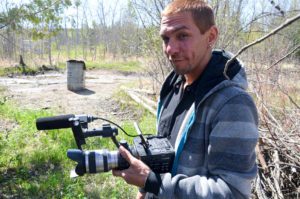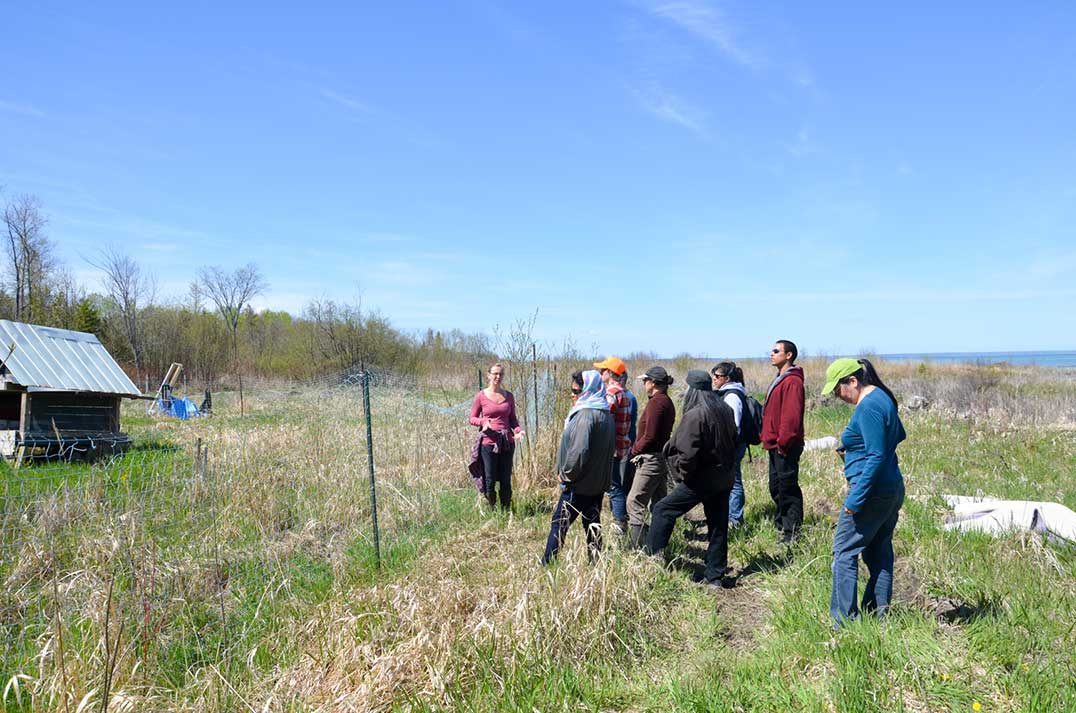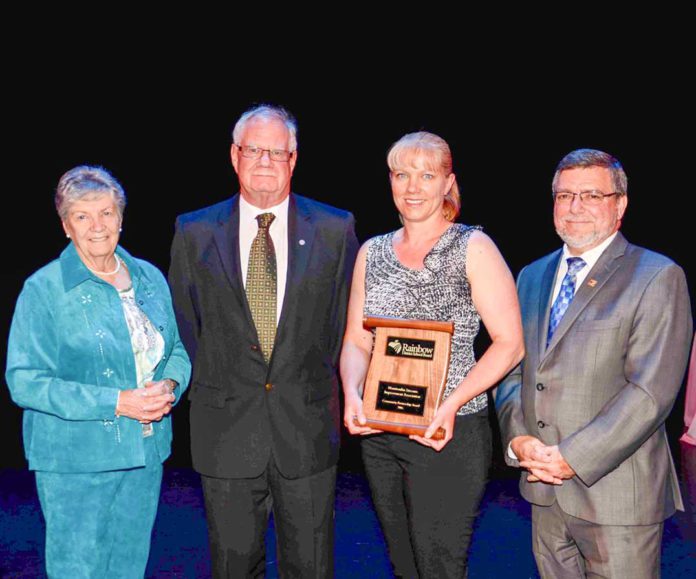HONORA BAY—Justin Tilson is up to his elbows in mud and straw and happy as a meadowlark. The permaculture expert is demonstrating one of the unique building material experiments currently underway on his Honora Bay property during a series of permaculture demonstrations during a site visit by students from the Permaculture Institute of Eastern Ontario (PIEO).
The site visit was being conducted as part of a permaculture design course being offered by the PIEO in collaboration with the Debajehmujig Storytellers of Manitowaning.
PIEO instructors Bonita Ford and Sébastien Bacharach presented the core 10-day permaculture design course, while Debajehmujig Storytellers delivered the accompanying Anishnaabek Skills and Knowledge course.

documentary recording of the permaculture design course events.
“We’ve been working together with Debajehmujig Storytellers for two years now and this is the third time they have invited us to the Island,” said Ms. Ford. “We have been exploring the connections between permaculture and Anishinaabe knowledge.”
“We have had a lot of fun teaching this permaculture design course and people enjoyed the Anishnaabe knowledge course,” agreed Mr. Bacharach. “We taught a 10-day course on permaculture design and that was followed by a four-day course on Anishinaabe knowledge taught by the folks here at Debajehmujig.”
The participants and instructors were honoured with a traditional celebratory feast at the Debajehmujig Creation Centre following the courses, where Debaj elder Jeannette Corbiere Lavell provided an invocation in Aninshinabemowin and prepared a spirit plate.
Following a hoop dance presentation provided by Katryna Wemigwans and Jiajia, a young Chinese visitor from Beijing, the permaculture instructors were presented with a gift by Ms. Corbiere Lavell and her son Nimki. “We like to poke a little fun with our gifts,” said Ms. Corbiere Lavell as the duo unwrapped a mining core sample from the tissue paper. “It has many uses and repurposes something connected to the land,” supplied Mr. Lavell.
“This will make incredible baguette,” rejoined Mr. Bacharach.
“This has been quite an interesting project,” said Debaj Artistic Producer Ron Berti, who noted that the course will certify participants to “do permaculture courses all over the world.”
The collaboration in permaculture fits neatly into the Debajehmujig Storytellers’ role as a land-based community theatre and a movement towards a more traditional style of theatre being embraced by the troupe.
“When Debajehmujig Theatre was first established it was on a model of western theatre,” said Mr. Berti. “That is all that there was at the time.” Over the past few years, Debaj has been reaching back to the future to establish foundations more in keeping with indigenous traditions and culture. Those connections are inextricably linked to the land.
Permaculture fits well with the new foundational underpinnings of Debaj, particularly with the links between sustenance, culture and storytelling. There is also a very practical application to be found in the study of permaculture. Mr. Berti referenced a TedX talk in which the speaker described his 100-acre property. “He feeds 365 people on that property, 365 days of the year,” he recalled.

Permaculture, the ethics, principles and design process, explains the PIEO website, “is based on living systems. Permaculture draws upon both traditional and scientific knowledge. It can be applied to physical systems (eg. farms, gardens, cities) and to social systems (eg. organizational flows, business models, school curricula) anywhere. Permaculture design can be broadly applied to land-based, urban, social or economic systems.”
To that end, permaculture includes: ethics, principles, design processes, and visible/physical and invisible/social applications.
Permaculture design is more than just techniques, notes the website. “It is a holistic way of understanding and interacting with systems and as such it is based on three ethics: Earth Care: We take care of the Earth, because our well-being depends on the Earth’s well-being. We recognize that it provides our essential life support systems; People Care: Humans have had a significant impact on all living systems on Earth. We do our best to take care of the needs of people—ourselves, our families, communities and societies—in ways that are as sustainable and regenerative as possible; Share the Surplus or Fair Share: We design with abundance in mind. We recycle and share this abundance to better take care of the Earth and the people.”
The four days of Anishnaabek Knowledge included in the course are Foundation Teachings, including the 4 Axes: planting, building, harvesting and hunting; foraging traditional foods, traditional medicines and healing; manoomin (wild rice); as well as time in the bush.




